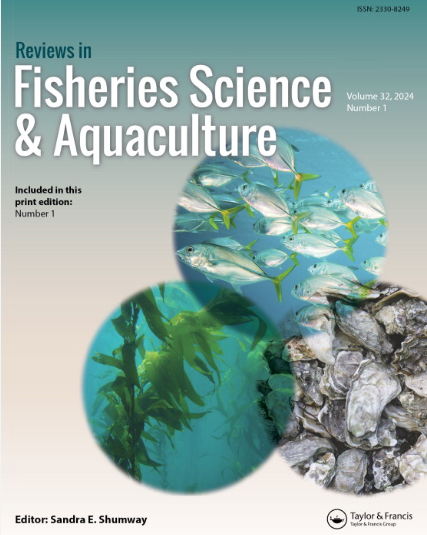从耳石化学角度优化鱼类种群划界的方法设计——时空分析量表综述
IF 6.4
1区 农林科学
Q1 FISHERIES
引用次数: 7
摘要
摘要耳石化学是研究鱼类结构最常用的工具之一。这种方法的正确应用取决于几个假设的实现。最相关的假设之一是,耳石和水的化学成分在适当的时空尺度上与所讨论的假设有关。由于没有适当考虑这一假设的出版物数量增加,有必要讨论和排序不同的概念,以帮助正确解释适用于种群划界的耳石化学所提供的信息。在此,结合时空尺度和生物地理学基础,讨论了基于耳石化学的种群判别方法中扩散概念的机会。此外,还开发了一个图形指南,以便于假设检验及其各自的解释。这篇文章鼓励进一步使用和关注年龄和生长数据、扩散能力和生活史,但建议进一步整合生物学与管理的问题,以及整合其他方法如何提供帮助,因为很可能没有单一的方法来解决股票结构问题。本文章由计算机程序翻译,如有差异,请以英文原文为准。
Optimizing the Methodological Design in Fish Stock Delineation from Otolith Chemistry: Review of Spatio-Temporal Analysis Scales
Abstract The otolith chemistry is one of the most commonly used tools to elucidate the structure of fish stocks. The correct application of this methodology depends on the fulfillment of several assumptions. One of the most relevant assumptions is that the otoliths and water chemistries vary at appropriate spatio-temporal scale in relation to the hypotheses being addressed. Due to the increase in the number of publications where this assumption is not properly considered, it is essential to discuss and order different concepts to contribute to the correct interpretation of the information provided by the otolith chemistry applied to the delimitation of stocks. Herein, the opportunity for dispersal concepts in otolith chemistry-based stock discrimination methods is discussed integrating the space-time scales, and biogeographic foundations. Additionally, a graphic guide was developed to facilitate hypothesis testing and their respective interpretations. This article encourages further use and attention on age and growth data, dispersal ability and life history, but further integration of the issue of biology versus management, as well as how the integration of other approaches may assist, is recommended, as most likely there will be no single approach to resolve stock structure.
求助全文
通过发布文献求助,成功后即可免费获取论文全文。
去求助
来源期刊

Reviews in Fisheries Science & Aquaculture
FISHERIES-
CiteScore
25.20
自引率
0.90%
发文量
19
期刊介绍:
Reviews in Fisheries Science & Aquaculture provides an important forum for the publication of up-to-date reviews covering a broad range of subject areas including management, aquaculture, taxonomy, behavior, stock identification, genetics, nutrition, and physiology. Issues concerning finfish and aquatic invertebrates prized for their economic or recreational importance, their value as indicators of environmental health, or their natural beauty are addressed. An important resource that keeps you apprised of the latest changes in the field, each issue of Reviews in Fisheries Science & Aquaculture presents useful information to fisheries and aquaculture scientists in academia, state and federal natural resources agencies, and the private sector.
 求助内容:
求助内容: 应助结果提醒方式:
应助结果提醒方式:


